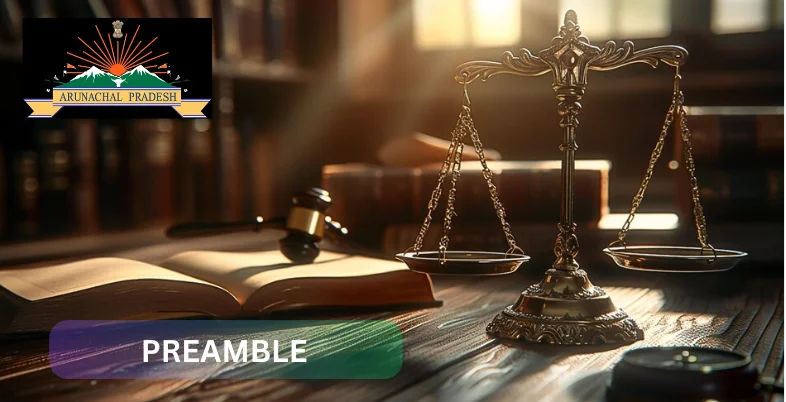Ingredients of The Preamble
The Preamble reveals four ingredients or components:
- Source of authority of the Constitution: The Preamble states that the Constitution derives its authority from the people of India.
- Nature of Indian State: It declares India to be of a sovereign, socialist, secular democratic, and republican polity.
- Objectives of the Constitution: It specifies justice, liberty, equality, and fraternity as the objectives.
- Date of adoption of the Constitution: It stipulates November 26, 1949 as the date.
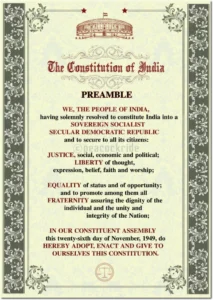
1. Sovereign
- The word sovereign” implies that India is neither a dependency nor a dominion of any other nation, but an independent state.
- There is no authority above it, and it is free to conduct its own affairs (both internal and external).
- Though in 1949, India declared the continuation of her full membership of the Commonwealth of Nations and accepted the British Crown as the head of the Commonwealth, this extra-constitutional declaration did not affect India’s sovereignty in any manner.
- Further, India’s membership of the United Nations Organisation (UNO) also in no way constitutes a limitation on her sovereignty.
- Being a sovereign state, India can either acquire a foreign territory or cede a part of its territory in favour of a foreign state.
2. Socialist
- Even before the term was added by the 42nd Amendment in 1976, the Constitution had a socialist content in the form of certain Directive Principles of State Policy.
- Notably, the Indian brand of socialism is a ‘democratic socialism and not a ‘communistic socialism (also known as ‘state socialism’) which involves the nationalisation of all means of production and distribution and the abolition of private property.
- Democratic socialism, on the other hand, holds faith in a mixed economy where both public and private sectors co-exist side by side.
- As the Supreme Court says, Democratic socialism aims to end poverty, ignorance, disease, and inequality of opportunity, Indian socialism is a blend of Marxism and Gandhism leaning heavily towards Gandhian socialism.
- The new economic policy (1991) of liberalisation, privatisation, and globalisation has, however, diluted the socialist credentials of the Indian State.
3. Secular
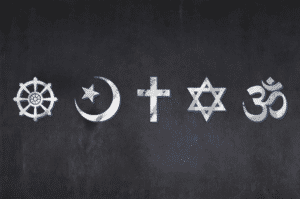
- The term “secular’ too was added by the 42nd Constitutional Amendment Act of 1976.
- There can be no doubt that Constitution-makers wanted to establish such a state and accordingly Articles 25 to 28 (guaranteeing the fundamental right to freedom of religion) have been included in the constitution.
- The Indian Constitution embodies the positive concept of secularism i.e., all religions in our country irrespective of their strength) have the same status and support from the state
Suggested Read👇🏻
- Making of the Constitution of India
- Post Independence History of Arunachal Pradesh
- Why History of NORTHEAST INDIA is Important?
4. Democratic
- The term ‘democratic’ is used in the Preamble in the broader sense embracing not only political democracy but also social and economic democracy.
- This dimension was stressed by Dr. Ambedkar in his concluding speech in the Constituent Assembly on November 25, 1949, in the following way: “Political democracy cannot last unless there lies at the base of it social democracy”.
What does social democracy mean?
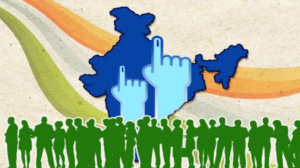
- It means a way of life that recognises liberty, equality, and fraternity.
- The principles of liberty, equality, and fraternity are not to be treated as separate items in a trinity.
- They form a union of trinity in the sense that to divorce one from the other is to defeat the very purpose of democracy.
5. Republic
- A democratic polity can be classified into two categories monarchy and republic.
- In a monarchy the head of the state (usually the king of queen) enjoys a hereditary position that is, he comes into office through succession, eg, Britain.
- In a republic, on the other hand, the head of the state is always elected directly or indirectly for a fixed period, eg. USA.
- Therefore, the term ‘republic’ in our Preamble indicates that India has an elected head called the President.
- He is elected indirectly for a fixed period of five years.
- A republic also means two more things:
- One, the vesting of political sovereignty in the people and not in a single individual like a king,
- second, the absence of any privileged class and hence all public offices being opened to every citizen without any discrimination.
6. Justice
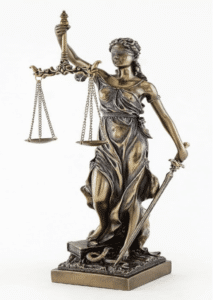
- The term “justice in the Preamble embraces three distinct forms-social, economic, and political, secured through various provisions of Fundamental Rights and Directive Principles.
- Social justice denotes the equal treatment of all citizens without any social distinction based on caste, color, race, religion, sex, and so on. It means a sense of privileges being extended to any particular section of the society, and improvement in the conditions of backward classes (SCs, STS, and OBCs) and women.
- Economic justice denotes the non-discrimination between people on the basis of economic factors.
- It involves the elimination of glaring inequalities in wealth, income, and property.
- A combination of social justice and economic justice denotes what is known as ‘distributive justice’
- Political justice implies that all citizens should have equal political rights, equal access to all political offices, and equal voice in the government.
- The idea of justice-social, economic, and political-has been taken from the Russian Revolution(1917)
7. Liberty
- The term ‘liberty’ means the absence of restraints on the activities of individuals, and at the same time, providing opportunities for the development of individual personalities.
- The Preamble secures to all citizens of India liberty of thought, expression, belief, faith, and worship, through their Fundamental Rights, enforceable in a court of law, in case of violation.
- Liberty as elaborated in the Preamble is very essential for the successful functioning of the Indian democratic system.
- However, liberty does not mean license to do what one likes, and has to be enjoyed within the limitations mentioned in the Constitution itself. In brief, the liberty conceived by the Preamble or fundamental rights is not absolute but qualified.
- The ideals of liberty, equality, and fraternity in our Preamble have been taken from the French Revolution (1789-1799).
8. Equality
- The term ‘equality’ means the absence of special privileges to any section of the society, and the provision of adequate opportunities for all individuals without any discrimination.
- The Preamble secures to all citizens of India equality of status and opportunity.
- This provision embraces three dimensions of equality–civic, political, and economic.
- The following provisions of the chapter on Fundamental Rights ensure civic equality:
(a) Equality before the law (Article 14).
(b) Prohibition of discrimination on grounds of religion, race, caste, sex or place of birth (Article 15).
(c) Equality of opportunity in matters of public employment (Article 16).
(d) Abolition of untouchability (Article 17).
(e) Abolition of titles (Article 18).
- There are two provisions in the Constitution that seek to achieve political equality.
- One, no person is to be declared ineligible for inclusion in electoral rolls on grounds of religion, race, caste or sex (Article 325).
- Two, elections to the Lok Sabha and the state assemblies to be on the basis of adult suffrage (Article 326).
- The Directive Principles of State Policy (Article 39) secures to men and women equal right to an adequate means of livelihood and equal pay for equal work.
9. Fraternity
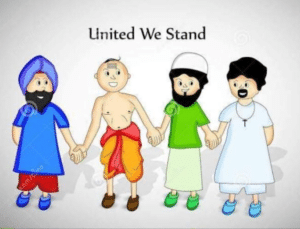
- Fraternity means a sense of brotherhood.
- The Constitution promotes this feeling of fraternity by the system of single citizenship.
- Also, the Fundamental Duties (Article 51-A) say that it shall be the duty of every citizen of India to promote harmony and the spirit of common brotherhood amongst all the people of India transcending religious, linguistic, regional or sectional diversities.
- The Preamble declares that fraternity has to assure two things the dignity of the individual and the unity and integrity of the nation.
- The word “integrity has been added to the preamble by the 42nd Constitutional Amendment (1976).

